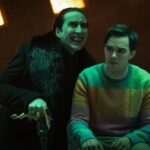Don’t Get Too Comfortable, by Tyler Smith
Roger Michell’s Le Week-End is a very simple film in premise, but remarkably complicated in subtext. Nick and Meg celebrate their anniversary by returning to Paris, where they honeymooned all those years ago. They proceed to take in the culture while reflecting on their marriage. As one might assume, not all of those reflections are pleasant.
And it is in this assumption that the film resides. As somebody that has been married for almost nine years, a lot of how this couple relates to one another already rings true. The stories already told, the shorthand of looks and noises, the instinctive awareness of the other’s traveling preferences. I can’t imagine how much more I’ll be able to relate to this film in ten or twenty more years.
Being tied to another person can be very hard at certain times, while being the best thing imaginable at others. Somehow, while on vacation, these two prospects can happen within minutes of each other. The couple may know each other better than anyone, but that can mean that they are also very aware of the years of personal needs not met, of resentments long simmering. This means a brief comment- perceived as an insult- can lead to a very hurtful argument, shortly before both parties come to their senses and forgive one another.
Played by Jim Broadbent and Lindsay Duncan, these people have a very believable history. We feel every year they’ve been married through the way they snuggle and the way they can laugh so comfortably. Of course, we can also see the frustration flash across their faces; frustration that they’ve been dealing with for years, even decades. After being married to each other for so long, their ability to relate to one another isn’t conscious. It has become instinct. And for two actors to be able to adequately convey that- to make us believe they have a real history together- is something to behold.
Though at times the film seems as though it is trying to convey a little too much (it would appear that they’re not merely going to address some issues on this trip, but in fact they’re going to tackle all of them), it is still a pleasure to spend time with these characters. Neither is perfect, and it’s entirely possible that, if we were to encounter them in real life, we would find them nearly insufferable. But it’s not about our reaction to them; it’s about the way they react to each other. They are in love, and have been for some time, and we are allowed to watch everything that that entails.
It also helps that as the film starts to lag, it gets a burst of energy in the form of Jeff Goldblum, playing an old friend from Broadbent’s past. Goldblum is an on-screen presence that is, at this point, just as familiar to us as Nick and Meg are to each other. Seeing him get a chance to play a character with zeal and passion- as well as a fair amount of pretension- is a pleasure. And yet, underneath the usual ticks and quirky cadence, Goldblum crafts a character that uses his charm and eccentricity to hide a deep self loathing. In many ways, it makes sense to have this character played by as iconic a performer as Jeff Goldblum. We need somebody that we think we already know to show us that there is always much, much more underneath.
Indeed, that is what Le Week-End is about. It is about questioning familiarity. It is about finding a way to revitalize that which we have long since become comfortable with. It’s about asking what we really know about other people, even those that we think we truly understand. Nick and Meg love each other; that much is clear. But what does that even mean when a relationship spans decades? Love can be seen as a decision that leads to action, or it can simply be seen as a state of being. While there’s nothing wrong with the latter, it can too often lead to complacency. Le Week-End explores the idea that love is a thing that need to be maintained from time to time, lest it become worn down and rusty; a thing to be thrown out.






























Watched this one last week, would thoroughly recommend it. Goldblum adds that extra spark to it that he wasn’t given a chance to do with the overly fussy Budapest Hotel.